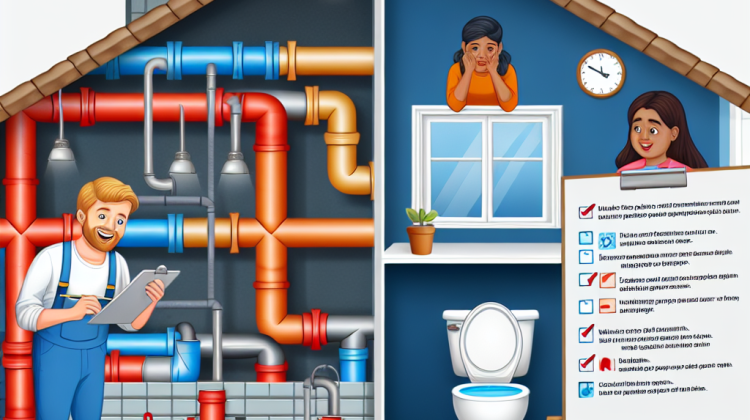
Did you know that the average household loses about 10,000 gallons of water every year due to leaks? That’s enough to fill a swimming pool! Plumbing might not seem like a big deal, but it plays a huge role in keeping our homes comfortable and safe. When everything’s working right, you hardly think about it. But what if something goes wrong? That’s the question every homeowner dreads.
Plumbing has been around for thousands of years, and it’s really quite amazing. Ancient Romans had sewers and aqueducts made of clay and lead, which helped keep their cities clean. Today, most of our plumbing is made of plastic and metal, making it much easier to fix. Knowing if your home plumbing is okay is super important, especially since a small problem can quickly turn into a big, messy disaster. A leaky pipe or a clogged drain can mean more than just a little inconvenience; it can cause damage and cost a lot to repair!
You can spot plumbing issues without being a pro. First, check for any strange noises in the pipes. If you hear gurgling or hissing sounds, that could be a sign of trouble. Also, keep your eyes peeled for water stains on the walls or ceilings, which can show up like unwelcome guests. And while you’re at it, don’t forget to keep an eye on your water bill. If it suddenly spikes for no reason, that could mean a leak is lurking somewhere. Just imagine opening that bill and wondering how you used so much water!
Another simple trick is to look at your water pressure. If your shower feels like a weak sprinkle instead of a refreshing downpour, it might be a sign your plumbing isn’t doing its job. A sudden drop in pressure can mean there’s a blockage somewhere. It’s kinda like when a traffic jam slows everyone down—you gotta find out what’s causing it!
Don’t forget about the drains! All those hairballs and soap scum can build up, making it harder for water to go down. If you notice water lingering in your sink or tub, think about giving those drains a good cleaning. A little vinegar or baking soda can work wonders. It’s like a spa day for your pipes!
Lastly, make sure to check your faucets and toilets. If they’re dripping or running constantly, that’s a clue that something’s not quite right. Those little drips may not seem like much, but trust me—they add up! A leaky faucet can waste a lot of water over time, not to mention it can be super annoying.
By keeping an eye on these indicators, you can stay ahead of any plumbing problems. With just a little effort now, you can avoid those unexpected plumbing surprises later.
How to Know if Home Plumbing is Okay
Checking if your home plumbing is okay isn’t as tricky as it sounds! With just a little attention, you can spot problems before they get outta hand. Here are some signs to look for:
Listen for Strange Noises
If you hear gurgling, clanking, or hissing sounds from your pipes, pay attention! These noises could mean some plumbing issues. For example, gurgling may mean there’s a blockage. Listen closely; it’s like your plumbing is trying to tell you something!
Keep an Eye on Your Water Pressure
Water should come out of the faucet smoothly. If it’s weak or suddenly becomes too strong, that might be a sign of trouble. A drop in water pressure can mean there’s a leak or blockage somewhere in your pipes.
Check for Leaks
- Look under sinks, around toilets, and behind appliances for water spots.
- Feel around for dampness. If something’s wet that shouldn’t be, it could be a leak.
- Check the walls and floors too! Peeling paint or soft spots might mean there’s more going on than meets the eye.
Smell for Strange Odors
Got a weird smell in the house? It might not be your brother’s gym socks! A sewage-like odor could mean there’s a problem with your plumbing system. If you notice a bad smell near drains, it could be time to check things out.
Look for Stains
Stains on your ceiling or walls are red flags. If you see brown spots, that could mean there’s a leak above, or worse! Catching it early can save a lot of headaches (and money).
Monitor Your Water Bill
If your water bill suddenly spikes without explanation, something might be up. A hidden leak can waste gallons of water, which makes your bill go up! Regularly checking your water bill can help you spot these sneaky leaks.
Test the Drains
When you run water in the sink or tub, it should drain quickly. If it’s slow, you might have a clog. To test it, fill up the sink and then let it drain. If it takes forever, you might need to do some investigating or call a plumber.
Check Your Toilets
Toilets can be tricky little machines! A running toilet can waste lots of water. To see if yours is running, put some food coloring in the tank and wait a bit. If the color ends up in the bowl, you’ve got a leak!
Keeping an eye on these details can help you catch plumbing problems before they become big headaches. Remember, about 10% of homes have leaks that waste more than 90 gallons of water every day!
“`html
How to Know if Home Plumbing is Okay FAQ
What are signs my plumbing is leaking?
Look out for wet spots on walls, ceilings, or floors. If you see water stains or puddles, that’s a big clue. Also, if your water meter keeps running when no water’s on, you might have a leak!
How can I check my water pressure?
You can get a water pressure gauge from the store. Just attach it to a faucet and turn on the water. If the pressure is too high or too low, you might need to call a plumber!
What do I do if my toilet is really slow to flush?
A slow-flushing toilet could mean a clog. Try using a plunger to clear it. If that doesn’t work, check the tank to see if the flapper is broken or needs adjusting.
What causes foul smells from my drains?
Foul smells usually come from food or gunk stuck in your pipes. You can try pouring baking soda and vinegar down the drain to help clear it out!
How can I tell if my water heater is working okay?
If your water isn’t getting hot, or there’s noise coming from the heater, it might need a check-up. Look for leaks around the heater, too!
Why does my sink drain slowly?
Slow drains often happen because of clogs. Hair, soap, and food can build up over time. You might need to clean your drain or use a plumber’s snake!
What should I do if my pipes freeze?
If you think your pipes are frozen, turn on the faucet to help relieve pressure. Then, use a hairdryer or warm towel to gently warm up the pipes. Don’t use anything hot that could crack them!
When should I call a plumber?
If you see constant leaks, really bad clogs that you can’t fix, or hear strange noises from your pipes, it’s time to call a plumber. Better safe than sorry!
How do I prevent plumbing problems?
Keep hair and food out of drains, check your pipes for leaks regularly, and don’t pour grease down your sink. Regular maintenance can save a lot of trouble later!
What should I check for in my basement plumbing?
For basement plumbing, watch for damp spots, water stains, or rust on pipes. Make sure your sump pump is working well, too, if you have one!
“`
How to Know If Your Home Plumbing Is Okay
To check if your home plumbing is okay, keep an eye out for leaks. Look under sinks, around toilets, and outside where pipes might be. If you see puddles or wet spots, that’s a red flag! You should also listen for weird sounds. If your pipes are gurgling or making strange noises, something might be off. Don’t forget to check your water pressure, too. If it’s weak and you can’t fill a glass quickly, it might mean trouble.
Another thing to do is check for strange smells. If you smell something funky, it could mean a blockage or a leak. It’s also super important to look at your drains. If water’s draining slowly or you notice any clogs, that could be a sign of plumbing issues. Lastly, pay attention to your water bills. If they go up and you’re using the same amount, you might have a hidden leak somewhere. By keeping an eye on these things, you’ll know if your plumbing’s in good shape or if it needs a little TLC. After all, a little maintenance now can save you a lot of headaches later!
